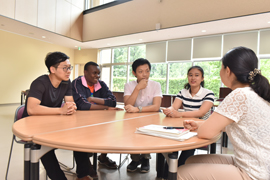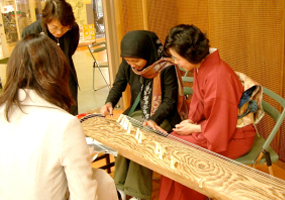

Nikkensei refers to the foreign students who will train their Japanese language skills, learn about current affairs in and involving Japan and deepen their understanding of Japanese culture at Japanese universities as Japanese government-sponsored (by the Ministry of Education, Culture, Sports and Science) scholarship recipients.
Tokyo University of Foreign Studies is the first Japanese national university to accept the Nikkensei students. About 20 students study at JLCTUFS every year.
This course features classes dealing with ‘learning in many languages and a multicultural environment’ and ‘Enhanced Japanese and Japanese Education’. The students are able to structure the contents of their courses depending on their major fields of study and level of Japanese.
From October to September in the following year.
24
The students learn the Japanese language in the ‘All-University Japanese Program (8 levels in total with over 40 subjects) in accordance with their Japanese language skills. They also take ‘Specialized Subjects exclusively for Nikkensei students’, which is a subject only offered in the Nikkensei program. In addition, depending on their specialized field of study and Japanese language skills, they must demonstrate the results of their year of research and training in the forms of reports and/or essays at the research paper presentation at the end of the academic year. The Nikkensei students with highly outstanding Japanese skills (those with a level over 800 in the All-University Japanese Program) are also able to take classes at the Faculty of Foreign Studies.
In principle, lectures are held for 13 weeks in both the first half and the second half of the school year.
Students whose Japanese level is between 400 and 700 are required to take General Japanese (2 to 5 classes per week, depending on the student’s Japanese level) and Written Expression. The following two specialized subjects are mandatory for Nikkensei students.
Lectures are held for courses such as History and Society of Japan, Japanese Society and Culture, Japanese Language and Culture, Japanese Language and Society, Special Theory of Japanese Socio-culture, Special Theory of Modern Culture, Society with Multilingual Society and Culture, and Special Theory of Japanese and Japanese Culture.
We hold survey trips in and out of school when necessary.
For Japanese language classes, the students can select Japanese courses for every language skill in addition to the compulsory General Japanese.
Rie Suganaga and five other members (as of January, 2016)
The students received customized guidance from the main course advisor and from the teachers that specialize in each topic for the report to be submitted for completion of the course. Tutors are also available to provide support for the students.
December: Events for Japanese Culture Exchange
(Experiencing traditional activities such as Go, Shogi, Ikebana-Flower Arranging, Wearing a Kimono, and Tea Ceremony.)
November/January: Off-Campus Field Trip (past trips include the Ghibli Museum, a visit to the House of Councillors, and museum tours, etc.)
July: Research Paper Presentation.
Upon the completion of designated subjects, the students submit a completion-report/essay, and make a verbal presentation. A diploma is then granted to those who meet the requirements for completion.
It is possible to get credits. Exchange/transfer on academic records will be up to the discretion of the schools from which the students come.

One condition for study is sufficient Japanese language skills necessary for one year of study and research. Another is sufficient motivation to decide and carry out research on a topic which generates interest in Japanese language and culture, and to submit an original report on the completion of one year of study.
Each program for Research Students under Monbukagakusho Scholarships, Preparatory Educational Program for International Students under Monbukagakusho Scholarship (6 month course), Training Program of International Teachers under Monbukagakusho Scholarships, Research Students Program in Japanese language and Japanese Culture, offers classes in JLCTUFS’s own and unique specialized fields. Taking the Japanese language skills of students into account, we offer subjects such as Current Affairs in Japan, Japanese Education, Japanese Culture, Cross-Cultural Communications, and other general education subjects. Customized guidance is also offered as a part of education in the specialized fields for research students under Monbukagakusho Scholarships.